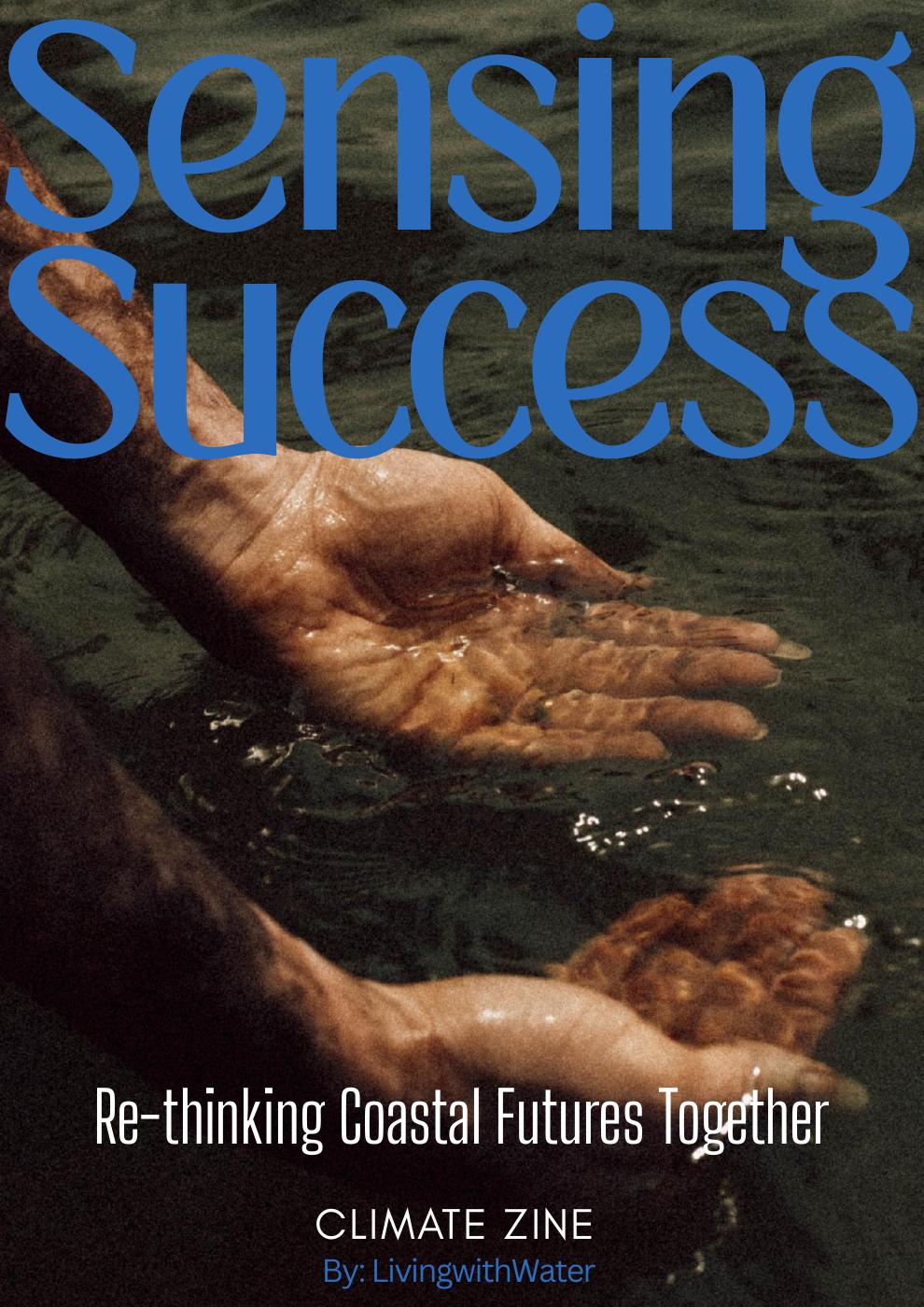
Re-thinking Coastal Futures Together
Climate Zine by LivingwithWater
Sensing Success
What are zines?
Zines are self-published mini-magazines used to amplify underrepresented voices and challenge dominant narratives. They offer flexible, nuanced ways to integrate diverse worldviews. Like the LWW project, we work at the intersection of Western science and local knowledge systems, which calls for thoughtful and creative tools.
Why did we engage with a zine?
Among current coastal adaptation efforts—and arguably broader climate change work—there is a need for more playful and creative ways of doing our work. It is evident that our current status quo is not sufficient to face our changing climate, which demands new and innovative ideas. One way to generate such ideas is through playful, arts-based methods. Working in a tactile and tangible way allows people to think outside the box and have fun throughout the process. That is why we decided to co-create a zine during our workshop; to expose folks to new ways of engaging with communities and stakeholders and generating new ideas. Not every thought will necessarily lead to a tangible solution, but the conversations and reflections that occur throughout the process of making the zine are valuable.
Background on zines
Although the term “zines” only became mainstream in the 1930s, some argue that zines have been around since the 1500s, when Martin Luther published the 95 Theses. These self-published booklets, pamphlets, and papers helped mobilize people’s thoughts and ideas, providing an outlet for voices that were not covered in mainstream newspapers.
By the 1930s, zines became popular in the science fiction community, where fans created them to hypothesize and critique theories, ultimately fostering a sense of community. By the 1970s, zines moved from the science fiction scene to punk culture, serving primarily as an outlet to promote nonconformity. The punk feminist movement Riot Grrrl made significant headway in using zines as part of an activist movement against sexism.
Today, zines continue to be powerful mediums for promoting climate and social justice by providing a platform for underrepresented voices and communities. If you’d like to check out more climate-related zines, here are a few examples: Solastalgia, We Did It!?, Convivial Thinking, Construyendo Otros Mundos, Biodiversity Zine.
Theme of the zine
The theme of the zine invited participants to creatively and playfully explore what success means in coastal adaptation. It acknowledges that success is not a one-size-fits-all goal and appears across various scales. Success is not necessarily the absence of failure but the lessons and reflections gained along the way.
Prompts that informed the zine
To further explore the theme, these prompts were provided to spur reflections on how people relate to the coastline in ways that resonate with them and to inspire somatic reflections. Attuning to the five senses encourages a different way of thinking about and reflecting on our connection with the environment and how these relationships can help reimagine what success means in coastal adaptation. These prompts were seeds to be planted, not strict guidelines to follow. The prompts included examples of different ways people could respond, accommodating various artistic skill levels, from writing a few sentences to collaging. Within the final product, it is apparent how differently people responded to the prompts they selected; this reflects the idea that success is not a one-size-fits-all answer, nor should it be. People relate to their environments in different ways, spurring different values and, therefore, different approaches to adaptation.
1: Where do your feet take you?
Think of a place on a coast where you share a fond memory, connection, story, etc. How does this place reflect what you value in a coast?
2: The land and water are speaking—what do you hear?
What wisdom, knowledge, and lessons can we learn from the land and water about resilience and loss? What shared values might emerge when we listen together?
3: Who is missing from the conversation?
When rethinking success, whose voices need to be included and amplified? What values might they bring, and how can they expand our shared understanding of success?
4: What does our success feel like?
What relationships need to be fostered to achieve collective success along the coast? What shared values can emerge when we feel seen and accountable to one another?
5: Breathe in the air—what do you notice?
We often smell the shifts in seasons and temperatures (e.g., flowers blooming or rainfall). When you imagine the future of a coastline that reflects shared values, what fills the air?
Final product
The final co-created zine is an accumulation of everyone’s responses to the prompts above. Folks could focus on one prompt or select multiple prompts if time allowed. The zine is organized by prompt, however, we encourage folks to find common themes and messages across all prompts!
We want to extend a huge thank you to Felicia Watterodt for pre-cutting and providing many of the images and magazines used in the final product. The activity wouldn’t have run so smoothly without her contributions.
We ask folks not to download or screenshot this zine, as participants have not provided their consent for its distribution. However, if you would like to share this zine as an example of what a zine can look like, please email Kees Lokman at klokman@sala.ubc.ca .
We hope you enjoy the Sensing Success zine :)
